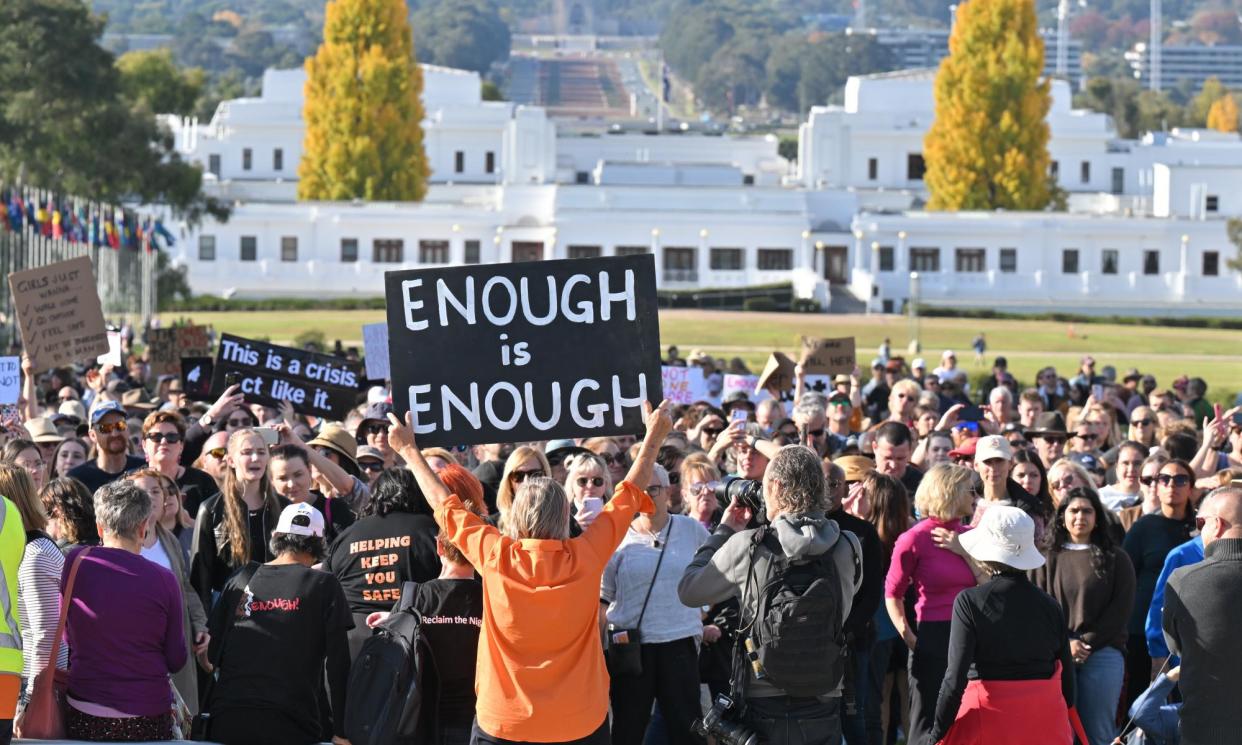National Legal Aid calls for $300m funding increase to keep Australian women safe

More than $300m additional annual government funding is needed to meet demand for legal aid services related to family violence, the national peak body has warned, as Australia grapples with a crisis of murdered women.
The National Legal Aid chair, Louise Glanville, said that national rallies against gendered violence held over the weekend demonstrated that the community expected more to be done.
Twenty-seven women have been violently killed this year, according to data compiled by advocacy group Destroy the Joint’s project Counting Dead Women.
“We have the infrastructure and ability to support victim-survivors of domestic and family violence to receive our legal and non-legal supports,” Glanville told Guardian Australia in a statement.
“However, National Legal Aid is concerned that the limited funding for family law services means we are unable to meet the current demand and we are concerned this could put women at risk.
“Without adequate legal assistance funding, it’s the most disadvantaged women – including victim-survivors of domestic violence – who lose out.”
Related: National cabinet eyes improved information sharing on gender violence offenders
Glanville said recent modelling identified that an additional $317m in annual funding was needed to meet demand for family and civil law, including for family violence services.
She said that in NSW there had been an increase of about 30% in demand for family advocacy and support services duty lawyer representation over the past year, a 61% increase in duty services provided by the domestic violence unit and a 36% increase in calls to the unit’s hotline.
Melanie Alexander, a Legal Aid NSW domestic violence unit senior solicitor, said that she was seeing a clear increase in demand for services on the ground.
“As a duty solicitor on any given day I see between six to 10 clients, and most of these women present with a real risk of harm to themselves or their children,” she said.
“It is clear to us the scale of the problem with the amount of people seeking help.
“The volume of clients accessing our service continues to increase on a daily basis.”
Alexander said that not only were more women seeking help but they typically had a wider range of concerns.
“I have noticed women presenting with more and more complex issues – often requiring help with an ADVO [Apprehended Domestic Violence Order], as well as housing, debt and parenting issues – and they need more of our time.
“Most clients express huge relief at receiving advice and knowing their options to keep themselves and their children safe, often after many years enduring violence.
“The work is at times confronting, with many women facing harrowing circumstances. We are providing services to some of the most vulnerable women in our community at a time of crisis in their lives and so we have to be mindful of the impact of the work on ourselves and support staff.”
The federal attorney general, Mark Dreyfus, is considering an independent review of the national legal assistance partnership (NLAP), an agreement that funds Legal Aid Commissions, Community Legal Centres, and Aboriginal and Torres Strait Islander Legal Services.
The agreement expires next year, and the review was completed by Dr Warren Mundy last month.
“The NLAP is a $2.4bn agreement between the commonwealth and state and territory governments to fund vital legal assistance services for the most vulnerable people in Australia,” Dreyfus said in a statement last month.
“Dr Mundy was asked to consider how future arrangements could better provide access for justice for all who need it.
“Legal assistance is essential to ensuring access to justice and equality before the law.”
Dreyfus has ruled out a royal commission on gendered violence.
But an urgent national cabinet meeting has been convened for Wednesday, with the prime minister, Anthony Albanese, saying all governments nationwide – including his own at the federal level – must make changes and focus more on stopping perpetrators.


